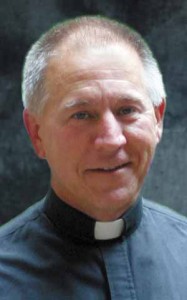By Father Bud Grant

St. Ambrose University Student Government Association recently hosted a panel discussion concerning topics of concern to voters in the upcoming election. As a presenter, I was asked to rate the political parties on their environmental “sustainability” position. I gave the Democratic Party a C- (for a paltry few initiatives planned) and the Republican Party an F (for actually removing “climate change” from their platform). The next day I received an excellent question from one of our students. He asked how one should vote, since no one political party is “right” on all the moral issues of concern to Catholics.
Of course, I began my reply by warning him that I was not going to tell him how to vote since that would violate the sanctity of his own conscience (not, by the way, an obstacle to certain aggressive organizations targeting the so-called “Catholic vote”). Here is what I did say.
The individual conscience is the ultimate authority in matters of morality. This means that we cannot abrogate our duty to become well informed and then opt for something like this simple — and insidious — contention of one online voter guide that “a well-formed conscience will never contradict Catholic moral teaching. For that reason, if you are unsure where your conscience is leading you when at the ballot box, place your trust in the unwavering moral teachings of the Church” (www.politicalresponsibility.com/voterguide.htm). It went on to mention five carefully selected “non-negotiable” issues designed to appeal to Catholics. Notice how that assertion deviously undermines the Catholic Church’s insistence on the moral authority of our conscience even while claiming to affirm it.
Not all moral issues are of equal weight so one can’t simply tally the pro and con totals and vote accordingly. There are some issues which are so central to our faith and moral convictions that they ought not to be lightly set aside. Among these are a host of pro-life issues such as abortion, social justice, universal health care, support for the poor, and environmental sustainability, to name but a few.
It may not be immediately obvious that environmental sustainability is a pro-life issue, but it is, and on a great many levels. Barry Commoner, the eloquent voice of environmentalism who passed away just before the Feast of St. Francis of Assisi, always insisted that social justice and environmental justice go hand in hand. He is right. Billions of people do not have access to clean drinking water. At least two billion are under-nourished. Perhaps one billion “environmental refugees” have fled drought, blight, chemical contamination, pollution, nuclear fallout and disease … all environmental crises, much of it caused by humans.
Environmental sustainability is even more deeply pro-life. There is near unanimous consensus among the scientific community that near-future generations face a truncated quality of life because of what will be gone before today’s toddlers are adults. Mid-century is a sort of tipping point when we pass from the more-or-less subtle changes in our global ecosystems to more dramatically obvious shifts: no glaciers, no elephants, less diversity, less beauty. This is no mean thing, especially for Christians for whom the quality of our life is of vastly greater significance than the quantity of our possessions.
And then there is this. Catholic Christians have, for our entire history, affirmed the essential and intrinsic value of God’s Creation while condemning as heretical the claim that this world does not matter. To be pro-life, in its most panoramic vistas, means to be pro-earth. If we hope to recognize Christ in the Resurrection, we must see him in our human relationships and in our communal relationship with the rest of creation.
None of this is to say that a Catholic should vote pro-environment, of course. Rather, this is merely a nudge toward informing our own personal consciences so that, along with all the other pro-life issues which we rightfully take seriously, environmental sustainability might be factored into our voting consideration.
(Father Bud Grant is an assistant professor of theology at St. Ambrose University in Davenport.)







